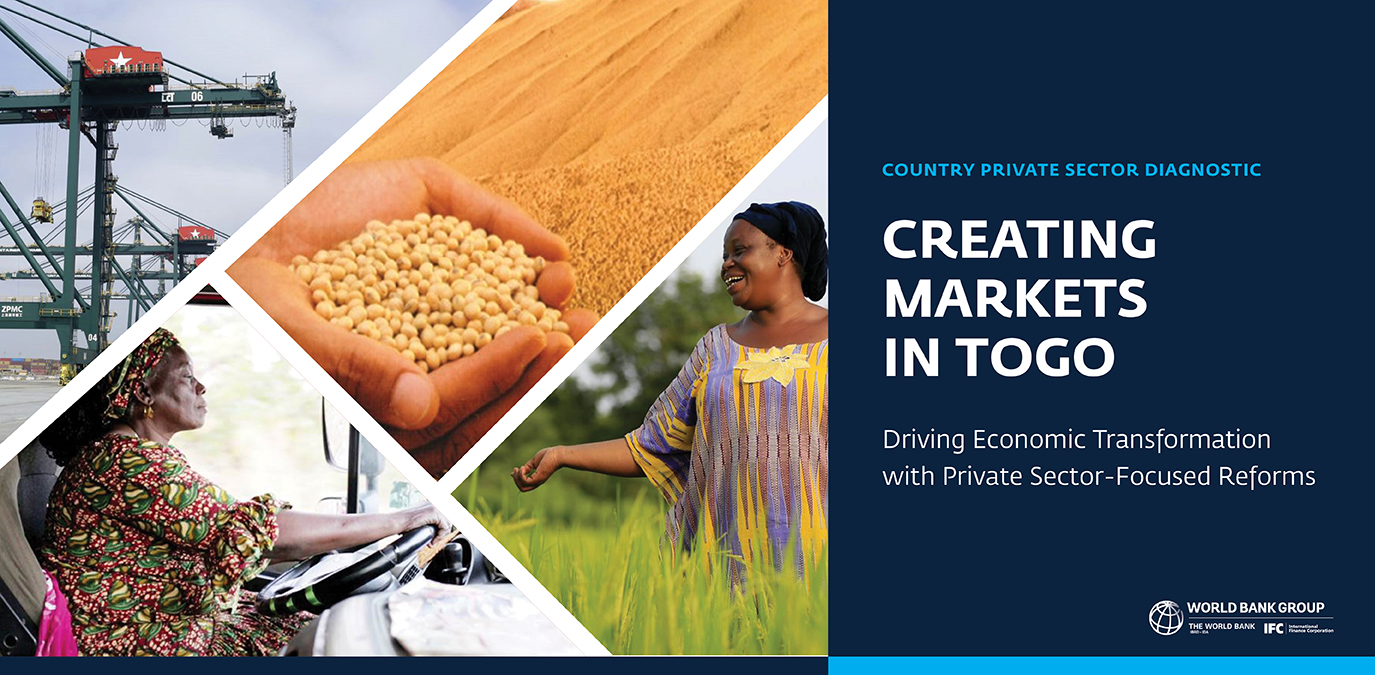
Lomé, Togo, May 9, 2023 — Togo can transform its economy, spur job creation, and reduce poverty by increasing private sector participation in its agriculture, transport, and logistics sectors, and by strengthening its energy and telecommunications infrastructure, according to a report published today by IFC and the World Bank.
The Togo Country Private Sector Diagnostic (CPSD) takes an in-depth look at private sector challenges and opportunities in Togo, identifies areas for reform and sectors with the greatest potential to advance Togo's private sector–led development, in alignment with Togo's National Development Plan (NDP 2018–2022).
The report comes as Togo emerges from the global COVID-19 crisis but faces new headwinds, including from rising inflation and increased prices of staple goods. The country is turning to the private sector to create jobs and opportunities for its growing population and recently introduced investment climate reforms to support its telecommunication and energy sectors and transferred some public assets to the private sector in telecoms, banking and agriculture.
"The CPSD is designed to help Togo sustain its growth momentum by promoting business-friendly reforms, catalyzing private investment to leverage its strengths, especially in agriculture, and through increased regional integration," said Kyle Kelhofer, IFC Country Manager for Togo. "IFC is a strong partner with Togo to help it realize its development ambitions."
"The CPSD aims to help Togo achieve its development goals and boost job creation – as articulated in the Togo 2025 government roadmap – by leveraging key sectors for growth such as agriculture, logistics, services and extractive industries," said Fily Sissoko, World Bank Country Manager for Togo. "This CPSD is also an important analytical work to inform the World Bank Group 2023-2027 country partnership strategy which will help Togo improve its business environment, productivity and competitiveness to create more and better jobs."
The CPSD highlights cotton, soybeans, cashew, and pineapple as products with high potential for expanding local value chains and processing and for export markets. Private investment in agricultural development zones and processing centers, along with support for farmers to help them access quality seeds and fertilizers, will also support the sector, according to the report.
The CPSD also highlights the need for Togo to implement policies to improve and modernize its air, road and maritime transport sectors, custom systems, and the regional corridor served from Lomé. This will increase private investment and productivity and help Togo reach its stated goal of becoming a logistics and business hub in West Africa.
Improving the functioning and the quality of the transport network linking Togo to Burkina Faso - and the interface between the port, logistics facilities, and the network itself - would offer significant trade opportunities in the sub-region and prospects of growing the economy.
The CPSD additionally calls for increasing access to finance for individuals and MSMEs and for more reforms and partnerships to attract private investments in the energy, finance, and telecoms sectors to boost competitiveness, inclusiveness, and opportunities in the country.
In line with the CPSD's findings, the World Bank Group's strategy for Togo focuses on agribusiness, infrastructure, power, ICT, manufacturing, transport, and logistics.
The Togo CPSD can be downloaded here in French and English.
About the Country Private Sector Diagnostic
Launched in 2017 as a corporate priority, the World Bank Group's Country Private Sector Diagnostics support the institution's strategic focus on expanding private investment and leveraging private solutions to address development challenges in client countries. The diagnostics assess critical constraints to private sector engagement and identify policy and regulatory reforms needed to unleash private sector growth. They are jointly delivered by IFC and the World Bank. For more information, visit www.ifc.org/cpsd.
About IFC
IFC—a member of the World Bank Group—is the largest global development institution focused on the private sector in emerging markets. We work in more than 100 countries, using our capital, expertise, and influence to create markets and opportunities in developing countries. In fiscal year 2022, IFC committed a record $32.8 billion to private companies and financial institutions in developing countries, leveraging the power of the private sector to end extreme poverty and boost shared prosperity as economies grapple with the impacts of global compounding crises. For more information, visit www.ifc.org.
About the World Bank Group
The World Bank Group plays a key role in the global effort to end extreme poverty and boost shared prosperity. It consists of five institutions: the World Bank, including the International Bank for Reconstruction and Development (IBRD) and the International Development Association (IDA); the International Finance Corporation (IFC); the Multilateral Investment Guarantee Agency (MIGA); and the International Centre for Settlement of Investment Disputes (ICSID). Working together in more than 100 countries, these institutions provide financing, advice, and other solutions that enable countries to address the most urgent challenges of development. For more information, please visit www.worldbank.org, www.miga.org, and www.ifc.org.
Stay Connected
Contacts
Stay Informed
Sign up to have customizable news & updates sent to you.